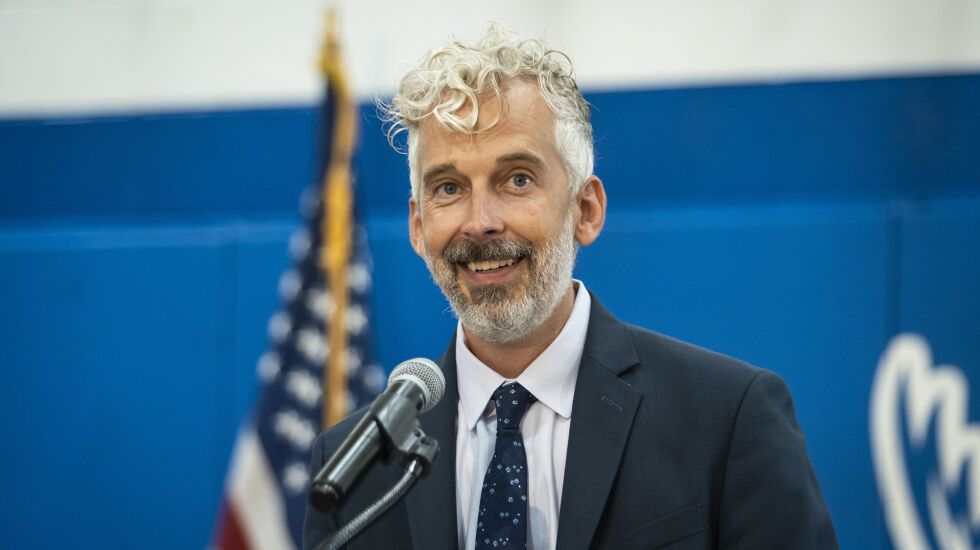
The longtime principal of a school for disabled teenagers and young adults has been chosen to lead the special education department at Chicago Public Schools, which has been through years of turmoil, accusations and investigations over its services.
Josh Long, who has spent the past 14 years as principal at Southside Occupational Academy High School, has been tabbed to lead the district’s special education services for more than 52,000 students with learning, developmental and physical disabilities. Long announced his appointment in a letter to the school’s staff and families on Monday.
CPS officials didn’t immediately comment. Long’s appointment is expected to go to the Board of Education for approval this week.
Long will be tasked with taking steps to better serve those students in a district where special education services have been troubled for years. He’ll take the helm at a time when about 16% of CPS kids receive special education services, the highest percentage in at least a decade.
Long is a trained speech pathologist with a long history in special education. He won the prestigious Golden Apple Award in 2019. In his first job in CPS, where he started in 2000, he traveled from school to school delivering services. In an interview with WBEZ, he said he decided to become a principal after noticing disparities in special education services and support between schools.
He became principal of Southside Occupational in 2010. The school, which has locations in West Englewood and Bronzeville, enrolls about 360 students with developmental disabilities aged 16 to 22 and helps them transition into adulthood by teaching life and job skills.
In his note to Southside Occupational families, Long said the school has been his “second home.” He thanked teachers and support staff for their work and parents for “placing your trust in Southside Occupational Academy as the crucial last step for your children before graduation.” He said working with students there “has been the greatest gift of my career.”
“Together we have created high-quality educational experiences for students in a dynamic and supportive environment,” he wrote.
“Through community partnerships, innovative programming, rigorous curriculum and instruction, increased technology, arts-infused learning, and the addition of our Career and Community Connections Hub, we have become a model for the education of students with disabilities,” Long continued, perhaps previewing his vision for the district’s services. “Collectively, we have worked to transform the lives of students while providing them with anything and everything that they may need to be as independent as possible within their communities upon graduation.”
Ben Felton, CPS human resources chief, said the search for a new special education leader was the most robust in recent memory — other than the one for a new CEO — because it included parents, district staff, disability advocates, the state monitor, the Chicago Teachers Union and board members.
“My hope is that that positions the chief to step in and be more ... successful on Day 1 because they went through that process and because they had the chance to engage with all those different stakeholders,” Felton said.
Board of Education member Mary Fahey Hughes’ son graduated from Southside Occupational last year. She and her son accompanied Mayor Brandon Johnson and CPS CEO Pedro Martinez on a tour of the school earlier this year, and she said, “The program here is amazing.”
Fahey Hughes, who chairs the Special Education Advisory Committee for the school board, said she would comment on Long’s appointment after the vote Thursday.
Long will have a tall task in his new role.
CPS’ special education department has been overseen by a state monitor for the past five years because the school system was found to have regularly delayed and denied services to students. But those troubles remain.
Long’s predecessor, Stephanie Jones, resigned in June after years of parent and activist criticism of CPS’ special education services under her leadership.
The department was most recently accused of violating state law by continuing to allow staff members to physically restrain students despite an order to pause restraints until staff were provided training required by law. The episode led to a vote of no confidence in Jones by the Chicago Teachers Union. CPS has since said it has met the restraint training requirements.
When Jones stepped down, CPS officials announced a national search for her replacement and this week landed on Long.
The district has also been trying to navigate a nationwide bus driver shortage that, until this school year, had particularly affected special education students, some of whom were enduring two-hour bus rides to get to school.
In an attempt to address long-standing concerns and address new student populations, CPS gave 85% of its schools more money for special education this year, adding $126 million to their special education spending.
But hundreds of special education positions are unfilled amid nationwide shortages.
Also, outcomes for students receiving special education services lag far behind other students. Fewer than 6% of students in special education were proficient in reading or math on the latest state exam, and the graduation rate stands at 77% — 10 percentage points lower than students without disabilities.
Nader Issa covers education for the Chicago Sun-Times.
Sarah Karp covers education for WBEZ.







